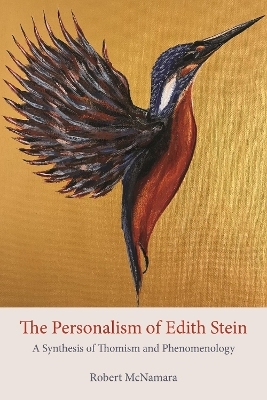
The Personalism of Edith Stein
A Synthesis of Thomism and Phenomenology
Seiten
2024
The Catholic University of America Press (Verlag)
978-0-8132-3747-3 (ISBN)
The Catholic University of America Press (Verlag)
978-0-8132-3747-3 (ISBN)
Provides an investigation of Edith Stein's mature philosophical anthropology, exploring her engagement with the thought of Aquinas and Thomism while maintaining the phenomenological mode of investigation.
Edith Stein's life and thought intersect with many important movements of life and thought in the twentieth century. Through her life and eventual martyrdom, she gave witness to the primacy of truth and faith in the face of political totalitarianism, and in her philosophical works, she contributed to a synthesis of phenomenological thought with the thought of Aquinas, while also progressively advancing a compelling form of philosophical personalism. As a result, Stein represents one of the most important Catholic thinkers of the twentieth century and is a figure of growing fascination and devotion among believers and nonbelievers alike.
The Personalism of Edith Stein is an investigation of Stein's mature philosophical anthropology, exploring her engagement with the thought of Aquinas and Thomism while maintaining the phenomenological mode of investigation. Through a careful examination of Stein's later works under the themes of human nature, the human individual, and the human being's relation to God, McNamara shows that Stein's mature personalism is considerably expanded and substantiated by her assimilation of key anthropological and metaphysical teachings of Aquinas and Thomism, and, conversely, that Stein significantly develops and deepens these same teachings through a phenomenological reconsideration of each from a personalist perspective.
As a whole, the study reveals the profound accord between Stein's mature thought and the received teachings of Aquinas, while yet carefully attending to the remaining differences between them. Ultimately, the author proposes that Stein imbues the teachings of Aquinas with a fundamental personalization such that her mature anthropology can be understood as a Thomistically informed personalism that represents a significant, original contribution to the anthropological dimension of the philosophia perennis.
Edith Stein's life and thought intersect with many important movements of life and thought in the twentieth century. Through her life and eventual martyrdom, she gave witness to the primacy of truth and faith in the face of political totalitarianism, and in her philosophical works, she contributed to a synthesis of phenomenological thought with the thought of Aquinas, while also progressively advancing a compelling form of philosophical personalism. As a result, Stein represents one of the most important Catholic thinkers of the twentieth century and is a figure of growing fascination and devotion among believers and nonbelievers alike.
The Personalism of Edith Stein is an investigation of Stein's mature philosophical anthropology, exploring her engagement with the thought of Aquinas and Thomism while maintaining the phenomenological mode of investigation. Through a careful examination of Stein's later works under the themes of human nature, the human individual, and the human being's relation to God, McNamara shows that Stein's mature personalism is considerably expanded and substantiated by her assimilation of key anthropological and metaphysical teachings of Aquinas and Thomism, and, conversely, that Stein significantly develops and deepens these same teachings through a phenomenological reconsideration of each from a personalist perspective.
As a whole, the study reveals the profound accord between Stein's mature thought and the received teachings of Aquinas, while yet carefully attending to the remaining differences between them. Ultimately, the author proposes that Stein imbues the teachings of Aquinas with a fundamental personalization such that her mature anthropology can be understood as a Thomistically informed personalism that represents a significant, original contribution to the anthropological dimension of the philosophia perennis.
Robert McNamara is assistant professor at Franciscan University of Steubenville and Associate Member of Faculty at the International Theological Institute and the Maryvale Institute.
| Erscheinungsdatum | 05.12.2023 |
|---|---|
| Verlagsort | Washington |
| Sprache | englisch |
| Maße | 152 x 229 mm |
| Gewicht | 272 g |
| Themenwelt | Geisteswissenschaften ► Philosophie ► Philosophie der Neuzeit |
| Religion / Theologie ► Christentum ► Kirchengeschichte | |
| ISBN-10 | 0-8132-3747-5 / 0813237475 |
| ISBN-13 | 978-0-8132-3747-3 / 9780813237473 |
| Zustand | Neuware |
| Informationen gemäß Produktsicherheitsverordnung (GPSR) | |
| Haben Sie eine Frage zum Produkt? |
Mehr entdecken
aus dem Bereich
aus dem Bereich
eine Geschichte der christlichen Kunst
Buch | Hardcover (2024)
C.H.Beck (Verlag)
CHF 44,75
von Athanasius bis Gregor dem Großen
Buch | Softcover (2024)
C.H.Beck (Verlag)
CHF 18,90


